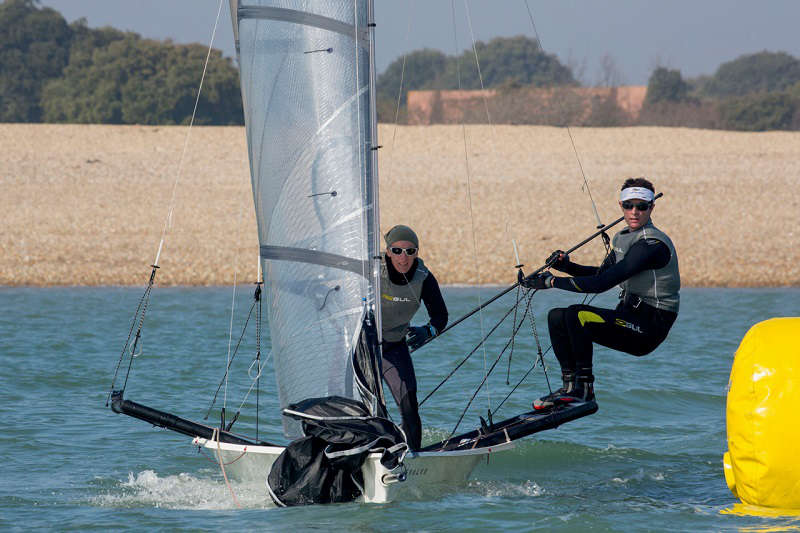Luke and Emma McEwen reckon that the RS800 provides the perfect combination of fun sailing, competitive racing and a great social scene on a reasonable budget.
When you’ve outgrown your 420, 29er or Radial, come back from uni and started your first job, and you want to do some enjoyable dinghy sailing, it’s not obvious what boat to sail. A tiny minority will take the Olympic pathway into 49ers or 470s but the rest of us are looking for a bit of fun at the weekends, a new challenge and a good social scene.
The RS800 was designed to offer high-adrenaline sailing and competitive racing for anyone who wants twin-wire excitement without spending hours bimbling in the boat park or a fortune on development kit. As a strict one-design, there’s no cheque-book route to winning; if you want to challenge the leaders it’s about time on the water learning to handle the boat. At the same time the hull shape is stable at speed and amazingly resistant to pitch-poling, while the light carbon mast makes the boat forgiving enough to gybe successfully even in big breeze. You don’t need to be super strong as the sheets have enough purchase to keep the loads reasonable, but sailing the RS800 is pretty athletic and keeps you fit. More fun than time in the gym!
Best of all, the weight and righting moment equalisation system really works, letting smaller sailors compete on equal terms with the big boys and girls across a wide range of 130kg to 160kg all up, with some teams still competitive well outside that range. As the crew and helm are the same distance out from the centreline it doesn’t matter which of you is heavier or taller. Indeed the class rules specifically allow helm and crew to swap whenever they like, so several teams like to take turns on the helm.
As the class approaches its 20th birthday, it’s apparent that Phil Morrison’s brilliant design has stood the test of time remarkably. Without compromising the one-design ethos, RS has continuously updated the RS800 to keep it looking fresh and adopting the best developments like square-top mainsails and giving the option for the crew to take the mainsheet. Older boats can be upgraded easily to remain competitive as an ex-29er helm showed in a boat that was 17 years old, almost his own age, coming 4th at the last Nationals and winning the final race. Second hand boats are now available for under £2k ready to race, and a really top spec boat is still only around £5k to £7k.
The class benefits from an enthusiastic association which runs about one event a month through the season in the UK, plus a couple of training events. RS events get good sponsorship and the emphasis is on fun off the water as well as competitive racing. There’s also a growing fleet of European sailors who invite us over to France, Holland and Italy for the European Championship and 3 other Eurocup events. The club racing and handicap scene is also strong, with upwards of 10 boats at some clubs and good results in the Sailjuice series over the Winter.
If you’re interested in trying an RS800 there’s a demo boat run by Stevie Wilson at RS. He can take you out for a spin and as multiple National and European champion, he can certainly provide good advice on how to get going in the class. For details see https://www.rs800.org/index.asp?Fleet=RS800&selection=Contact%20Form&area=Try%20an%20RS800
If you’re not sure, you can always get in touch with one of us through the class website or Facebook group; we’re always happy to answer questions.
Happy sailing,
Luke & Emma McEwen, RS800 Class Association Chairs
RS800 Class Association website: https://www.rs800.org/
RS800 facebook group: https://www.facebook.com/groups/846837232096757/
Image: Tim Olin

